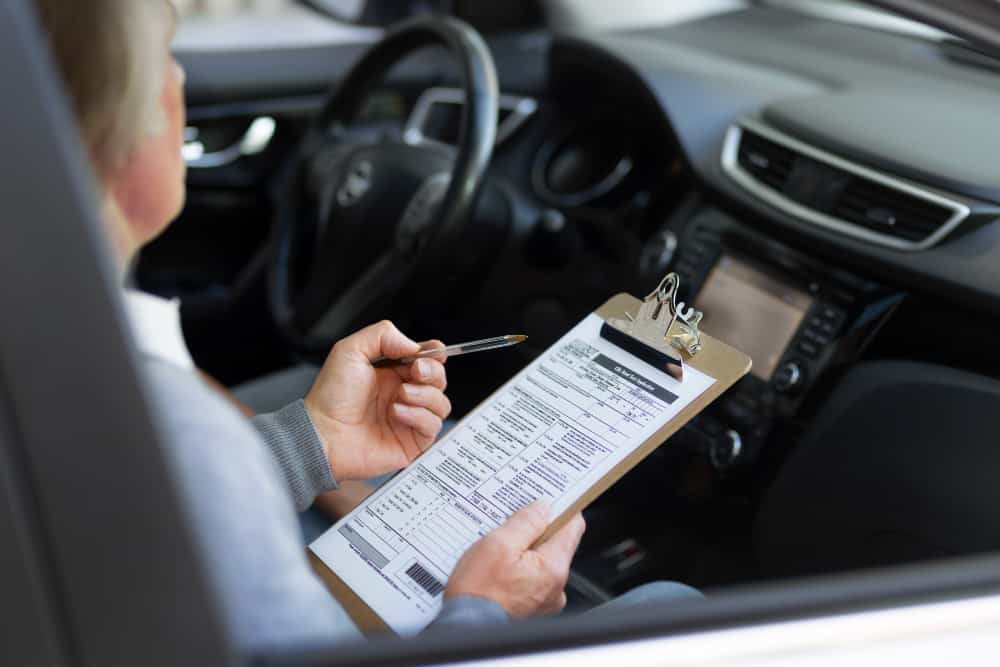By legal mandate, the official certification of a vehicle’s eligibility for public road use is the car registration. Neglecting to register your vehicle may lead to fines, tickets, and the possibility of your car being impounded.
Vehicle owners in the U.S. are required to register their cars through their state’s Department of Motor Vehicles (DMV) or transportation department. This registration process aids the state in monitoring the vehicles operated by its residents, ensuring an overall safe transportation environment.
But, exactly what does a car registration look like? How does one go about registering a car, and how does it differ from a car title? What documentation is necessary for the registration process, and is online registration an option? Well, don’t fret, we will be answering every bit of your questions, and in the simplest way possible.
What does Vehicle Registration Look Like?
Typically, you pay a fee to the state you live in, give them the necessary documentation, and get your car registered. As a proof, when you set everything up for the first time, you commonly receive a registration card, coupled with license plates or windshield stickers indicating the renewal date for your registration.
Some states opt for dispatching paper documents in lieu of a registration card; however, these documents invariably include nearly all vital details pertaining to the vehicle.
The methods for providing proof of registration may vary across states, but here is a set of universally essential information found on a vehicle registration card:
- Your complete name and residential address
- Car title ID number
- Vehicle Identification Number (VIN)
- License plate number
- Details about the make, model, and year of the vehicle
- Registration expiration date
Similar to your driver’s license, it is imperative to have your registration card with you whenever you are driving. Law enforcement authorities will request it if you are pulled over.
Car Registration vs Car Title
- Car Title
Think of a car title as the documented evidence confirming your complete ownership of the vehicle. It functions much like a birth certificate, not only pinpointing the vehicle’s identity but also tracing its ownership history.
Whenever the vehicle changes hands through a sale, a new auto title is issued in the state where it is registered. Unlike a car registration, a car title does not require periodic renewal, and you are not obliged to carry it in your vehicle. Explore more about car titles here.
- Car Registration
In contrast, a car registration serves as both evidence of ownership and certification that your vehicle is legally fit for operation on public roads.
It serves as a concrete confirmation that your car has undergone safety and emissions inspections (in some states), possesses appropriate insurance coverage, and that you have fulfilled the requisite tax and fee obligations
When do I Need to Register a Car?
There are several cases when a vehicle may need to be registered:
- Purchase from a Dealer or Individual
If you acquire a vehicle, whether new or used, from a dealer, the registration steps are typically handled by the dealership. However, in a private sale, you are responsible for initiating the registration process.
- Relocation to a New State
When you decide to move to a different state with your vehicle, it is imperative to register it in the new state. The reason is simple – each state has distinct car registration regulations, requiring you to keep up with that and register your vehicle accordingly. It’s worth noting that this does not apply to military personnel and full-time students.
Keep in mind that there is a finite period within which you must register your car or truck in the new state, depending on the specific rules of that state.
- Renewal Time
Vehicle registrations typically expire every one or two years, depending on the regulations of the state. Consequently, a renewal is required to ensure ongoing compliance with state requirements.
How to Get Car Registration?
When obtaining registration for the first time following the purchase of your vehicle, the process generally involves more steps compared to a straightforward renewal.
If you make your purchase at a dealership or a certified used car dealer, such as our establishment, there’s minimal concern, as we typically manage all the paperwork, including car registration, for you. However, when acquiring a vehicle from a private party or a relative, the responsibility of registering the vehicle falls on you.
To ensure you are well-prepared, it is advisable to confirm the specific documentation requirements from your state’s Department of Motor Vehicles (DMV) website. Nevertheless, here are some commonly required items when registering a new or used vehicle:
- A Driver’s License
Identification and proof of residence. A driver’s license usually satisfies both identification and proof of residence requirements.
- Car Insurance Proof (required in some states)
Proof that you are insured in the state that you live in.
- Sales Tax Payment Receipt (required in some states)
In certain states, evidence of sales tax payment on the vehicle’s purchase price is required.
Want to know about taxes in detail, check out this full guide: Do You Pay Taxes When Selling A Car In New Jersey?
- Certificate of Origin or Bill of Sale
A new car purchase necessitates a certificate of origin, typically provided by the dealership. For private transactions, a bill of sale is essential.
- Car Title for Ownership Verification
If you own the vehicle, present the car title; if leased, provide a copy of the lease agreement. If financed, demonstrate the lien agreement.
- Vehicle Safety Inspection and/or Emission Certificates (required in some states)
Particularly relevant to used cars, these certificates verify the vehicle’s mechanical soundness and adherence to the state’s emissions standards.
- Odometer reading (required in some states)
Some states require an odometer reading, indicating the vehicle’s current mileage.
- Vehicle Registration Application Form:
Complete the designated application form for vehicle registration.
- Payment
Be prepared to pay all applicable taxes and fees.
You can find your state’s DMV website through this resource.
How to Get a Car Registration in New Jersey?
The procedure for registering a car in New Jersey closely aligns with the previously outlined process. However, there are additional documentation requirements specific to the state. In instances where someone other than the purchaser is signing the documents, it becomes necessary to provide power of attorney documentation. Furthermore, if applicable, a dealer reassignment documentation is also required.
The registration of the purchased vehicle must be completed at the New Jersey Motor Vehicle Commission (MVC). It’s essential to note that walk-in appointments are not available for this purpose. Therefore, scheduling an appointment online is a mandatory step when registering a car for the first time in the State of New Jersey.
Can you Register a Car Online?
The trend is shifting towards facilitating first-time car registrations through online platforms in an increasing number of states. However, a considerable number of states still mandate the completion of this process in person, typically at a local Department of Motor Vehicles (DMV) office. Conversely, when it comes to renewals, the majority of states now provide the convenience of completing the process online.
To ascertain the specific requirements for your locality, it is advisable to check the official website of your local DMV.
How Do I Renew My Car Registration?
Once your car is already registered, the process of renewing your registration becomes significantly more straightforward. As mentioned earlier, numerous states facilitate online or mail-in renewal options.
For the renewal, you’ll typically need basic documents or information, including the car’s Vehicle Information Number (VIN), Vehicle registration card, License plate number, Driver’s license number, Proof of Insurance, and other relevant details depending on your state’s requirements.
It’s important to note that the renewal process may also entail new inspections to ensure the vehicle still complies with emissions and safety standards.
Generally, there is a window of 15 days to a month provided for you to renew your registration after its expiration. However, it’s crucial to verify this timeframe with your local DMV, as regulations may vary.
Find your state’s DMV website here.
How Do I Transfer my Car Registration to a Different State
If you’re relocating to a different state with your car, it’s imperative to register it in your new place of residence. States like New Jersey enforce a requirement for transferring the vehicle title and registration, with or without a lien, within a specified timeframe, often 60 days.
To streamline the process in a state like New Jersey, follow these steps:
- Schedule a “New Title or Registration” appointment.
- Gather essential documents, including proof of identification (typically a valid driver’s license), the original title, insurance information, a Completed Universal Title Application (Form OS/SS-UTA), and a Completed Vehicle Registration Application (Form BA-49). Ensure all forms are accurately filled out.
Click here to find more details specific to New Jersey.
How Much is Car Registration?
By completing the car registration process, you contribute to the state’s resources, supporting initiatives that enhance road safety.
The registration costs differ across states, determined by factors like the vehicle’s weight, age, market value, and fuel efficiency.
Fees for registration generally fall within the range of $20 to $80, contingent upon both the specific vehicle and the regulations of the state. Notably, certain registrations may be as economical as $8, while others can escalate to as much as $220.
Visit this page to calculate how much your vehicle registration costs in your state.
Should you Keep the Vehicle Registration Certificate in your Vehicle?
Indeed, it is imperative to have the vehicle registration certificate with you while on the road. This official document serves as the authorization for your vehicle to be driven on public roads. Law enforcement officers have the authority to stop you at any time and may ask to inspect these documents.
I Lost my Car Registration. How do I Get a Copy of Car Registration?
If details like your address haven’t changed, getting a copy of your car registration is pretty straightforward. You’ll need a few key pieces of information, such as your license plate number and VIN. Depending on your state’s regulations, you might be able to request a replacement online through the state DMV. Keep in mind that a nominal fee may be applicable in the process.
Can You Sell a Car with an Expired Registration?
The short answer is yes, you can!
Various reasons might lead to this situation, ranging from the car being unused for a period to it being registered in a different state than the one where you plan to sell it. Or perhaps your registration is nearing expiration, and you’re contemplating saving a few bucks before selling it in the coming weeks.
Here’s what you should be aware of:
- While some states do permit the sale of a vehicle with expired registration tags, it is crucial to verify this with your Department of Motor Vehicles (DMV). Confirm the legality and the specific information you need to provide to the buyer at the time of sale. Avoid running afoul of state laws and DMV regulations, as non-compliance may result in fines or penalties.
- Even if your state permits selling a car with expired car registration, you’ll likely have a hard time selling the car. Most buyers would want a test drive before finalizing on the car. However, an unregistered vehicle cannot legally be driven on the streets, and if pulled over, you may face legal consequences.
- The absence of car registration creates uncertainty about the roadworthiness of the vehicle, potentially raising concerns among buyers.
Also Read: Document Checklist for Selling Your Car
Can You Register a Car If You Don’t Have the Title?
Titles play a crucial role when registering your vehicle with the state. However, if you find yourself in possession of a vehicle without the corresponding title, there are viable solutions.
Again, start by visiting the website of your state’s DMV.
To acquire a replacement title, you must furnish evidence of the vehicle’s purchase, such as a bill of sale or a registration card that identifies you as the buyer. Review your state’s specific requirements for registering a vehicle without a title, but generally, you’ll need the following documents:
- Proof of ownership, like a bill of sale
- Confirmation of no existing liens or loans on the vehicle, unless the lender grants approval
- Verification of your identity
- Evidence of paid property taxes
- Proof of inspection
In instances where you lack a bill of sale or any proof of purchase, you may need to apply for what’s termed a “bonded” title. This serves as a safeguard for states against residents titling vehicles under deceptive circumstances and typically remains effective for three years. Reach out to your state’s DMV office or explore online resources to gather information about the application process for a bonded title.
Find Your Perfect Vehicle
Now that you’ve gained valuable insights into car registration, it’s the opportune moment to discover the ideal vehicle that aligns seamlessly with your preferences and needs.
At Schumacher Used, we present a diverse range of top-notch vehicles that adhere to the most stringent reconditioning standards. With a transparent and no-hassle approach to all processes including documentation, we have been serving New Jersey for nearly a century.
Feel free to get in touch and take the next step towards finding the car of your dreams!




